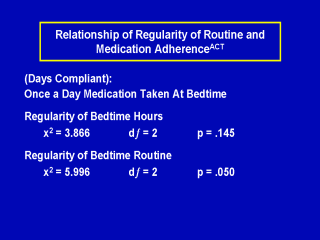 |
We have looked at some data suggesting that the variability
of individual schedules is an important determinant of whether or not patients adhere to
treatment. These data were taken from a study where we looked at strategies to promote
adherence among individuals who are on either or placebos and participating in a clinical
research study. We found a statistically significant difference between regularities of
bedtime routine and taking the medication, which has been prescribed to be taken in the
evening, either at dinner time or at bedtime. The rest of the day didn't matter. If you
look at how regular people live their lives, you find a very strong predictive
relationship around the time that they need to be carrying out the regimen. For these
folks, it didn't matter where they were. We often talk about the problem of people
traveling or having meetings or doing other kinds of things that disrupt their schedule.
We didn't find that to be as problematic as not having the same routine for going to bed,
no matter where you were going to bed. |
